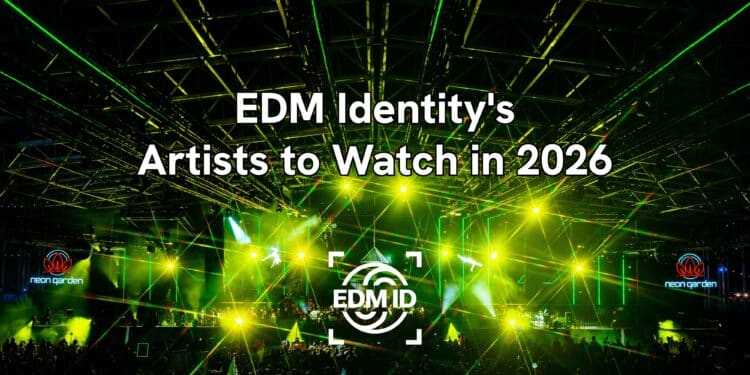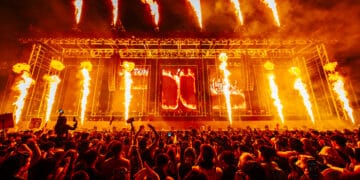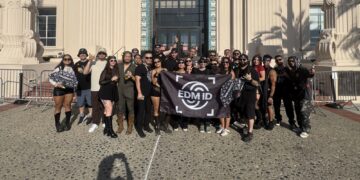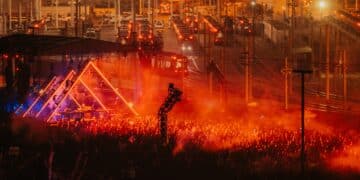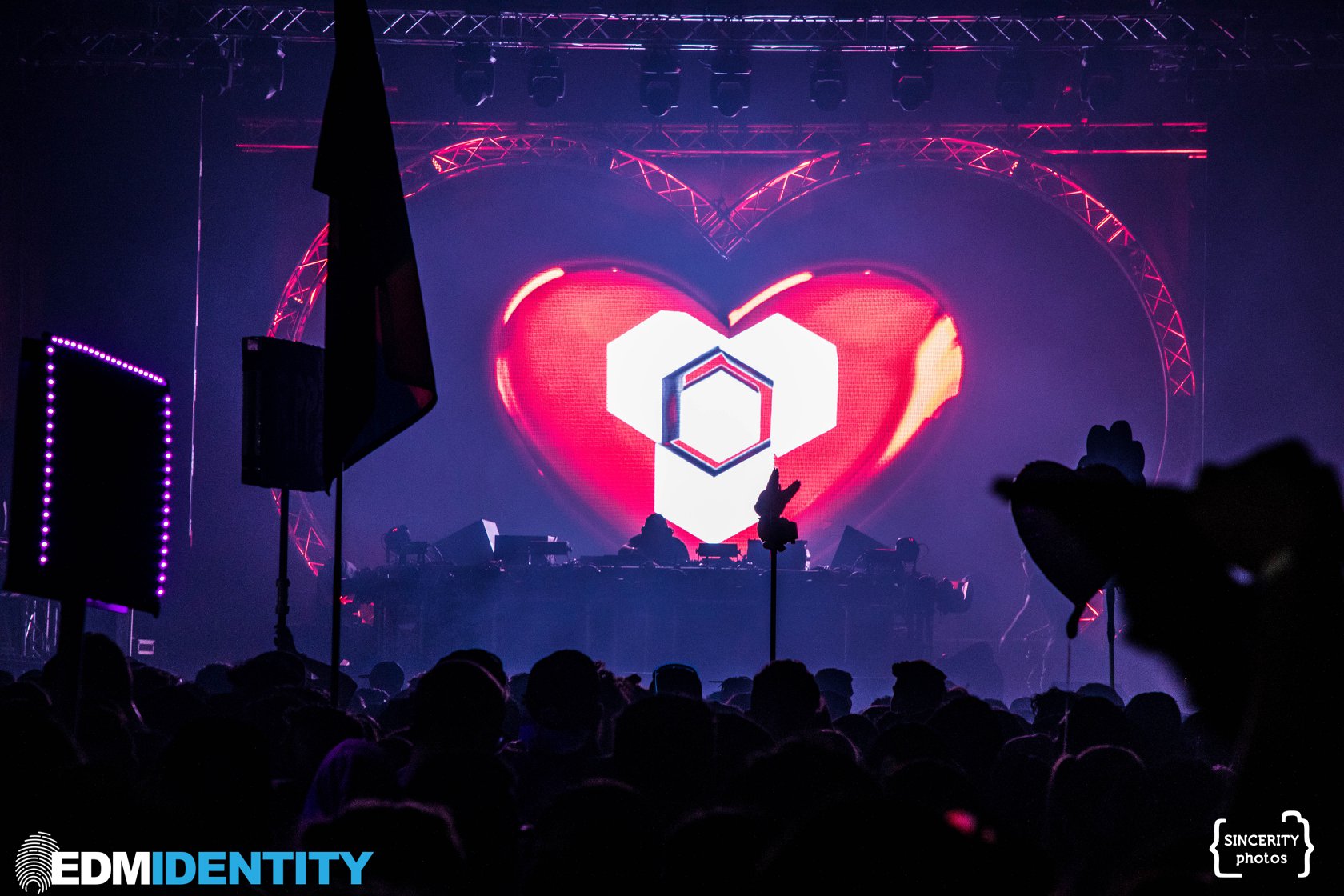DJ S3RL Talks The Australian Rave Scene, The Current State of Electronic Music, The Future of Happy Hardcore & More!
Who would have thought that PlayStation’s Music 2000 (marketed in North America as MTV Music Generator) would help launch a career in DJ-ing? This was the case for Australian hardcore DJ Jole Hughes aka DJ S3RL. To be fair, Hughes was already deeply entrenched in the Brisbane underground rave scene but the PlayStation game which allowed users to sample audio, add instruments, and much more was a definitive catalyst to Hughes’ prolific career. The theme of games, and all things “nerdy” would turn out to be a running theme in much of his music.
To many fans of games, anime and hardcore raving, DJ S3RL needs no introduction. Since bursting into the spotlight after being signed to the major international label in 2005, S3RL released hit after hit. He dropped his first vinyl with “Transformers”, and later went on to release massively popular tracks such as “Pretty Rave Girl” and the subsequent “Little Kandi Raver”. He then went on to start his own label, EMFA Music and continued to generate multiple hits such as “Pika Girl” and “Genre Police”.
Throughout his time in the scene, S3RL has made a name for himself as one of the most unique artists in the hardcore genre. In addition to creating a satirically-laced fast-paced style, S3RL could also be seen touring around the world. Now on his final tour, he found time to sit down with us at HTiD USA 2018 and discuss his final tour, his thoughts on the current state of hardcore music and more!
Stream “S3RL Currently Presents…” via SoundCloud:
Congrats on your final year of touring and pressing pause while still at a high point in your career. Was it a difficult decision to make such a huge shift from touring to staying at home? Will you continue playing around your home base?
Well, it was a pretty easy decision, but it was just a really drawn out one that I had to almost let happen organically. The decision was two-plus years in the making, and I slowly moved things around so that it would work. After 2018 I will not do any shows for at least a couple of years, then re-assess the situation to do the occasional show here and there.
In Australia or anywhere?
Anywhere. For example, if I was booked for a show in 2020 that I could bring my family along too I would consider it, but during the two years off I will not be doing any shows at home or away.
You have a unique sound that clearly falls within the hardcore umbrella but due to its speed and affinity for more of a high-pitched chipmunk style, there was a bit of “controversy” about it being called hardcore. What do you have to say to those listeners who say that you shouldn’t be considered hardcore?
I’ve accepted that now. I actually found that it works in my favor because now I have a niche subgenre of my own that no one wants to touch. In my head, Happy Hardcore is the general blanket term. UK Hardcore, J-core, Freeform etc. fall under as subgenres of Happy Hardcore, and I’m just another subgenre somewhere in there. For the most part, no one really cares, but there are always “genre police” out there that need to set definite lines between genres.
What are your thoughts on the state of happy hardcore or UK hardcore? Many fans say that the up-and-coming or newer hardcore artists don’t have that same fun and cheesy feel that came with to the older generation while others feel as though hardcore, like other music genres, is just evolving and listeners need to modify their expectations. What do you think?
I think it’s just part of the cycle. UK Hardcore specifically, if you think about it, has always been a higher BPM reflection of what’s musically trending. I got into hardcore around the mid-2000s when hard trance and hands up were popular. UK Hardcore, for the most part, sounded just like higher BPM hard trance & hands up. When the dubstep explosion happened, you had dub-core in the hardcore scene. The same happened with lots of other genres along the way.
Right now, hardstyle and trap sounds are what you’ll hear mostly in UK Hardcore, and as soon as something else takes the spotlight in mainstream music, it will turn into that. That’s a big thing that I try to stay away from; I’m happy to be influenced by what’s trending but not let it take over my whole sound.
Yes, because then it loses its identity.
Yes, that’s why I feel 90’s Happy Hardcore was such a definitive genre. It didn’t copy anything and was, for the most part, a completely original genre.
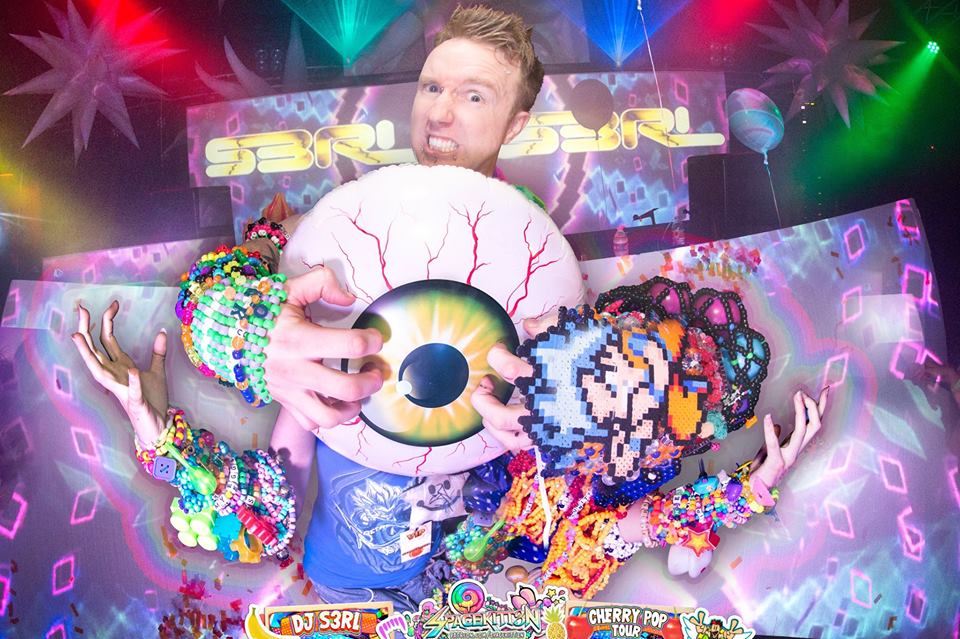
It’s interesting going out and raving now. You hear many ravers, old and new, who are adamant about PLUR being dead. At the same time, you have others who claim that PLUR is more about your state of mind and the people who surround you. What are your thoughts on PLUR and what does Peace Love Unity Respect and Responsibility mean to you?
I didn’t even know about PLUR before I started doing the US tours. It’s more of an American thing; it’s always sort of been around in Australia, but it’s much bigger in America. I think the reason some it’s still alive and well is because there are always new ravers that are enthusiastic about their new love of raving and everything is still awesome. Then you have the people who are jaded are obviously opposed to the whole idea.
The longer you’re in the scene the more behind the scenes stuff you’d end up seeing, and that’s when you’d start to get jaded and feel like PLUR was just an illusion. That’s why I think there are two sides to it. For me personally, I think it’s just a nice raver motto that helps create a sense of unity in the scene.
In the past, you’ve spoken about how growing up in Australia and being part of the rave scene as a raver influenced your styles and passion for the music you make. Australia has an amazing rave scene and nightlife but currently, the lockout laws really seem to have changed the atmosphere and negatively affected life over there. What’s your take on these laws and how have they affected you, if at all?
The Australian rave scene has gone through a lot of changes. When I was in my peak rave days in Brisbane, all age events were legal. There were always new ravers coming through keeping the scene fresh with numbers and diversity, then someone died at an event. Of course, ‘drug-fueled raves’ were scapegoated and under 18s shows were no more.
The rave scene no longer had a stream of new faces coming through and the scene eventually shrunk into very small and occasional club nights. Add on top of that the lockout laws, and it was almost the nail in the coffin. Meanwhile, in Sydney, they still have under 18 events and the scene going just as strong as ever with massive shows like Defqon.
In saying all that, the scene lately has been on somewhat of a comeback with new music and new promoters coming through. I think Hardstyle’s mainstream appeal and its crossovers with commercial genres, like trap, has made throwing only 18+ shows more viable.
I think the rave scene is good at rolling with the punches. No matter what they do there will always be a way to keep on raving.
Do you think those laws affected your fans?
My fan base has shifted almost 90% to America over the last 6 or 7 years. I’ve been getting way more gigs in America than Australia for a while now, so I it didn’t make much of an impact on me at all.
You’re known for being pretty vocal about your thoughts on the state of electronic music. In one interview you mentioned that, to some extent, as raves became more mainstream and commercialized, the scene lost its place as an escape from everyday life with like-minded people. Do you still feel this way? Also, how do you currently feel about the scene and what direction do you see it going in the future?
It’s very commercialized compared to how it was 10+ years ago. It’s not a bad thing, it has just evolved with the times. I feel like if I was a newbie raver and went to a big mainstream festival today, I would not have liked it because of how ‘bro’ orientated it is. As cliché as it may sound, I really did love the feeling of escaping regular life, getting away from the bro types for a night, and losing myself in the music with like-minded ‘outcasts’. Smaller events are where it’s at for me. Australia and US alike. There’s still that feeling of community and that sense of outcasts wanting an escape.
I’m usually completely wrong with my predictions so I’ll leave it pretty broad, but my guess is that big EDM festivals will die out and be replaced with whatever the next big thing in music is. The actual rave scene will go back to a small underground community, and of course, everything is a cycle so would only be a matter of time before it came back into the spotlight again.
When you look in the crowd, not necessarily with your fans, but at the events where you’re played with multiple other people or genres, do you still see that it has that essence?
All of the shows that I do in America, I definitely get that feeling that it still has its essence. I’m lucky in that the fanbase I attract is a super awesome one. The atmosphere they bring is magical and exactly what I love about raving.
Throughout your career, there have been references to anime and gaming in many of your songs. What are some of your favorite anime and games? Is there one you would recommend overall?
My favorite from everything I’ve seen recently would be “One Punch Man.” It feels like a full package to me – funny, great story, good animation etc. For old school, there’s Neon Genesis Evangelion and of course Akira, because that’s the classic that practically started it all. Also Berserk is a new favorite of mine.
For games, my favorite type is fighting games, so like Street Fighter. Although right now Street Fighter is at a low point. Right now I’m playing Dragon Ball Fighter Z and it’s really really good; the game plays exactly how a fighting fan would hope, and it looks better than the actual show.
You’ve played in numerous cities around the world at venues in Australia, the USA, a little bit of the UK, and more. As you are retiring from tour life, are there any events or countries you wish you could have played?
It would have been nice to get more gigs in the UK. I know I have a fan base over there that isn’t necessarily in the rave scene and have never had a chance to see me live. I would have liked to do like a con or something similar in the UK. I have had offers to play the UK a few times, but the way the scene works over there, with flights and everything, it would have cost me money to play for them. With having a young family, paying to work isn’t really at the top of the priority list!
Having stood the test of time after making music and creating your own tracks since the early 2000s, do you have any advice to any musicians out there trying to get recognized or break into the scene?
Everything is so different now! Even DJ-ing has changed so much. It’s to the point where you have to ham up your sets with gimmicks and give heartwarming speeches mid-set just to keep everyone engaged, and that’s just not something that I can do.
As far as music production goes, I think the best thing you can do is just keep making tracks that you think are as good as you can do. Learn from each track and get better. Eventually, you’re going to make something that people like
These days 85.79% of being a producer is networking and marketing. Even so, if it was me starting again right now, I would still just make music and not even bother with marketing. Sure, you need to get the song out there so people can hear it, but the song should sell itself, you shouldn’t have to force it down people’s throats.
Some of the more popular tracks of mine (Pretty Rave Girl, Pika Girl for example) were tracks I didn’t think people would like so I did as little as possible for them, besides uploading. The exact opposite of marketing. Even so, the tracks spoke for themselves and exploded.
It’s true, social media and fan interaction play such an important role now it seems. Some artists love it as they’ve said they love talking to their fans and get to cater to fans’ needs whereas other artists say that fan demands get to be too much. What do you think about social media and how it’s affecting artists?
I think just do what you’re comfortable with. Some people love putting themselves out there and some people don’t. I think just play to your strengths.
Who are some up and coming artists that you’ve been enjoying that are keeping the spirit of happy hardcore/UK hardcore alive?
There are lots and all around the world, too. Everyone should know Nanobii. I really like his stuff because he has his own signature sound and you always know a Nanobii track when you hear it. He is another that has their own little subgenre.
Daniel Seven is doing some good stuff because he makes a good range of different styles. There’s the ‘standard’ sort of hardcore to cater to fans, while also making a lot of different & unique sounding stuff as well, which is what keeps it fresh.
America has some great talent with producers like Hartshorn, Neo-Qor, Nobody & Jason Bouse making all types of Happy Hardcore. There’s a whole heap of US artists coming through that just need to build up their name.
As far as UK Hardcore goes, Stonebank has definitely shaped modern UK Hardcore, with so many other artists today being influenced by his sound.
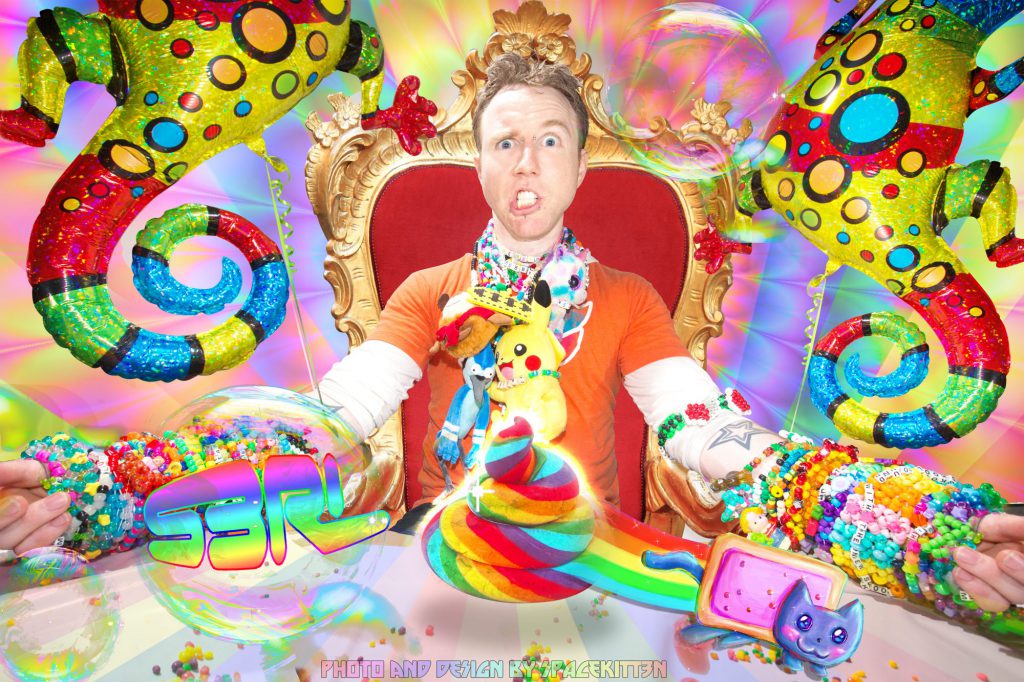
You were very active in your rave scene back when you were a raver and we’ve seen your pictures where your arms are filled to the brim with kandi. With that in mind, do you have a favorite piece of kandi you’ve either made or gotten?
There was one, it was a massive cuff and it was almost like a life-sized Pikachu made of beads. It had a little tail and the ears and everything It was massive. I still remember getting it, it was insane! I’ve also collectively gotten almost a full outfit; hat/visor, face mask, vest, sleeves, gloves, backpack, belts. I just need pants.
Last and most importantly, what’s your guilty pleasure food?
I’m not really much of a food person. I eat it and I shit it out. That’s about as fun as it gets for me. Although when I smoke weed everything tastes awesome!
Connect With DJ S3RL On Social Media:
Website | Facebook | Twitter | SoundCloud



